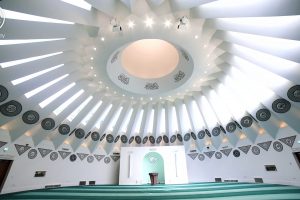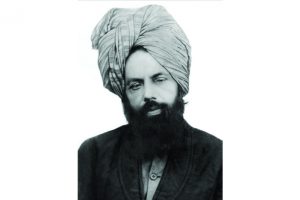
The interior design of the mosque is unique amongst mosques of the Ahmadiyya Muslim Community. A beautiful adornment of the attributes of God Almighty decorate the walls of the mosque.
His Holiness, Hazrat Mirza Masroor Ahmad(aba), the Worldwide Head of the Ahmadiyya Muslim Community, granted special guidance in all the various phases of the construction of the mosque as well as the calligraphy produced inside it. His Holiness(aba) said that the attributes will serve as a means of inspiring the worshippers to reflect and ponder over the meanings of each attribute. The Review of Religions continues with its exclusive new series in which a short commentary of each attribute has been detailed.
The calligraphy was designed by expert calligrapher Razwan Baig. This research has been compiled by the Research Cell Rabwah through Syed Mubashar Ahmad Ayyaz, and translated into English by Shahzad Ahmed and Zafir Mahmood Malik, Associate Editors of The Review of Religions.

The Wise Judge (Al-Hakam)
وَ اِنْ كَانَ طَآىِٕفَةٌ مِّنْكُمْ اٰمَنُوْا بِالَّذِيْ اُرْسِلْتُ بِهٖ وَ طَآىِٕفَةٌ لَّمْ يُؤْمِنُوْا فَاصْبِرُوْا حَتّٰى يَحْكُمَ اللّٰهُ بَيْنَنَاوَ هُوَ خَيْرُ الْحٰكِمِيْنَ
‘And if there is a party among you who believes in that with which I have been sent, and a party who does not believe, then have patience until Allah judges between us. And He is the Best of judges.’[1]
The attribute of اَلْحَکَمُ – Al-Ḥakam – is derived from the Arabic root of حَکَمَ (ha-ka-ma). The active participle from this root is الحَاکِمُ which means the one who issues a verdict.[2] This is also one of the attributes of God Almighty and signifies that He holds the final decree in all matters. This attribute is exclusively used for God Almighty and has been elaborated in the following narration of the Holy Prophetsa:
أَنَّهُ لَمَّا وَفَدَ إِلَى رَسُولِ اللّهِ صَلَّى اللَّهُ عَلَيْهِ وَسَلَّمَ مَعَ قَوْمِهِ سَمِعَهُمْ يَكْنُونَهُ بابي الْحَكَمِ، فَدَعَاهُ رَسُولُ اللّهِ صَلَّى اللَّهُ عَلَيْهِ وَسَلَّمَ، فَقَالَ: إِنَّ اللّهَ هُوَ الْحَكَمُ وَإِلَيْهِ الْحُكْمُ، فَلِمَ تُكْنَىب ابَا الْحَكَمِ , فَقَالَ: إِنَّ قَوْمِي إِذَا اخْتَلَفُوا فِي شَيْءٍ أَتَوْنِي فَحَكَمْتُ بَيْنَهُمْ، فَرَضِيَ كِلَا الْفَرِيقَيْنِ , فَقَالَ رَسُولُ اللَّهِ صَلَّى اللّهُ عَلَيْهِ وَسَلَّمَ: مَا أَحْسَنَ هَذَا، فَمَا لَكَ مِنَ الْوَلَدِ؟ , قَالَ: لِي شُرَيْحٌ، وَمُسْلِمٌ، وَعَبْدُ اللّهِ , قَالَ: فَمَنْ أَكْبَرُهُمْ؟ قُلْتُ: شُرَيْحٌ , قَالَ: فَأَنْتَ أَبُو شُرَيْحٍ
Abu Shuray Hanira Al-Kindi narrates that he once went to the Holy Prophetsa along with his tribe as part of a delegation. The Holy Prophetsa heard the people of the tribe referring to him as ‘Abul-Hakam’, which was his title. Upon hearing this the Holy Prophetsa called Abu Shuray Hanira and said: ‘Allah is the Best of Judges [Al-Hakam] and to Him belongs all judgment. Why have you been given the title of Abul-Hakam?’ He replied: ‘When my people disagree about a matter, they come to me, and I decide between them, and both parties are satisfied with my decision.’ The Holy Prophetsa stated: ‘Indeed, this is wonderful! Do you have any sons?’ He replied: ‘Shurayh, Muslim and Abdullah’. The Holy Prophetsa then enquired who was the eldest among them. He replied: ‘Shurayh’. The Holy Prophetsa then said: ‘This means that henceforth your title is Abu Shurayh.’[3]
God – The Ultimate Judge of all Things
The
Promised Messiahas writes, ‘Undoubtedly, God Almighty is merciful, benevolent
and forbearing. He never allows the one who supplicates to him to perish. You
ought to remain occupied in prayer and do not fear that owing to one’s inner
passion, one may commit sin. Indeed, God Almighty is the Ultimate Judge, if He
so wills He can command the angels not to record those sins.’[4]
The Most High (Al- Aliyy)

اللّهُ لَا إِلٰهَ إِلَّا هُوَ الْحَيُّ الْقَيُّومُ لَا تَأْخُذُهُ سِنَةٌ وَلَا نَوْمٌ لَهُ مَا فِي السَّمَاوَاتِ وَمَا فِي الْأَرْضِ مَنْ ذَا الَّذِي يَشْفَعُ عِنْدَهُ إِلَّا بِإِذْنِهِ يَعْلَمُ مَا بَيْنَ أَيْدِيهِمْ وَمَا خَلْفَهُمْ وَلَا يُحِيطُونَ بِشَيْءٍ مِنْ عِلْمِهِ إِلَّا بِمَا شَاءَ وَسِعَ كُرْسِيُّهُ السَّمَاوَاتِ وَالْأَرْضَ وَلَا يَئُودُهُ حِفْظُهُمَا وَهُوَ الْعَلِيُّ الْعَظِيمُ
‘Allah — there is no God but He, the Living, the Self-Subsisting and All-Sustaining. Slumber seizes Him not, nor sleep. To Him belongs whatsoever is in the heavens and whatsoever is in the earth. Who is he that will intercede with Him except by His permission? He knows what is before them and what is behind them; and they encompass nothing of His knowledge except what He pleases. His knowledge extends over the heavens and the earth; and the care of them burdens Him not; and He is the High, the Great.’[5]
According to the Arabic lexicon Aqrab Al-Mawarid, the meaning of عَلِيٌّ – ‘Aliyyun – means noble and lofty. The root words of ‘Aliyyun are recorded as عَلاَ یَعْلُوْ (‘Ala, Ya’loo) and عَلِی یَعْلیٰ (‘Ali-ya, Ya’laa). The active participle from the first root is: عَالِیٌّ (‘Aaliyyun). The words derived from this root can have both positive and negative connotations. For example, with reference to the Pharaoh, the Holy Qur’an states:
اِنَّ فِرْعَوْنَ عَلاَ فِی الْاَرْضِ
Verily, Pharaoh behaved arrogantly in the earth…[6]
However, the second root عَلِی یَعْلیٰ (‘Ali-ya, Ya’laa) is only used in a positive connotation. Hence, the attribute of God Almighty, الْعَلِيُّ (Al-‘Aliyyu) is derived from this root word.
Hazrat Abdullah bin Abi Aufah narrates that someone once came to the Holy Prophetsa and submitted: ‘I am unable to comprehend much of the Qur’an, therefore teach me enough from the Qur’an that would suffice me.’ The Holy Prophetsa replied: ‘Recite the following:
سُبْحَانَ اللَّهِ، وَالْحَمْدُ لِلَّهِ، وَلَا إِلَهَ إِلَّا اللَّهُ، وَاللّهُ أَكْبَرُ، وَلَا حَوْلَ وَلَا قُوَّةَ إِلَّا بِاللَّهِ الْعَلِيِّ الْعَظِيمِ
“Holy is Allah and all praise belongs to Him. There is none worthy of worship except Allah and He indeed is the Greatest. There is neither might nor any power except with Allah, the High, the Great.”’
He submitted: ‘O Messenger of Allahsa! This is in praise of God Almighty, what is there for me?’ The Holy Prophetsa stated: ‘Recite:
اللَّهُمَّ ارْحَمْنِي وَارْزُقْنِي وَعَافِنِي وَاهْدِنِي
“O Allah! Have mercy on me and provide for me; grant me security and guide me.”’
When he stood up, he put his hands up and recited the above prayer. Upon this the Holy Prophetsa stated, ‘He has filled his hands with blessings.’[7]
God – The Possessor of the Perfect Attributes
‘God is One without associate and no one else beside Him is worthy of worship and obedience. This affirmation is made because, if He were not without associate, there might be an apprehension that He might be overcome by a rival, in which case Godhead would always be in peril. The affirmation that no one is worthy of worship beside Him means that He is so perfect and His attributes are so excellent and exalted that if we were to select a god out of the universe who would be equipped with perfect attributes, or were to contemplate in our minds the best and most exalted attributes that God should possess, He would be more exalted than all of our fancies. Whom no one can exceed and Whom no one can be more exalted, that is God, to associate anyone in Whose worship would be the greatest wrong. Then He said: He is the Knower of the unseen, that is to say, He alone knows Himself.’[8]
The Reckoner (Al- Hasib)

وَاِذَا حُیِّیْتُمْ بِتَحِیَّۃٍ فَحَیُّوْا بِاَحْسَنَ مِنْھَآ اَوْ رُدُّوْھَا اِنَّ اللّٰہَ کَانَ عَلٰی کُلِّ شَیْئٍ حَسِیْبًا
And when you are greeted with a prayer, greet ye with a better prayer or at least return it. Surely, Allah takes account of all things.[9]
The attribute الْحَسِیْبُ – Al-Ḥasīb – is derived from the word حَسَبَ (ha-sa-ba). The meaning of حَسَبَہُ is to count something. It also means to seek retribution or punishment. The phrase حَسِیْبُکَ اللہُ مِنْکَ means ‘may Allah Himself exact revenge from you’. This particular meaning of the word has been used in the Holy Qur’an in the following verse:
وَ کَفٰی بِاللّٰہِ حَسِیۡبًا
And sufficient is Allah as a Reckoner.[10]
Hazrat Aishahra narrates that the Holy Prophetsa stated: ‘Whosoever is held accountable on the Day of Judgement shall be punished.’ Upon this Hazrat Aishahra enquired: ‘Has God Almighty not stated:
فَسَوْفَ یُحَاسَبُ حِسَابًا یَسِیْرًا
“He will soon have an easy reckoning.”’[11]
The Holy Prophetsa replied: ‘This does not refer to being “held accountable”; this simply means to be presented before God Almighty. However, on the Day of Judgement, the one who is questioned intensely regarding their deeds will be the ones who face punishment.’[12]
The Day of Judgement – Distinguishing between the Truth and Falsehood
The Promised Messiahas wrote, ‘After one’s demise, the soul still has an attachment with this world. The soul of a true believer has a relationship with both the heavens and the earth. In reality, the reckoning will take place in barzakh, the intermediate state between death and judgement. However, to distinguish between all people will remain, and this will occur on the Day of Judgement. Countless prophets, antichrists, liars, disbelievers, accursed ones, etc., will receive their due status on this day. It is for this reason that everyone will be gathered together whereby some will be granted the seat of honour, while those who rejected the truth will be given a chastising punishment. Thus, it will be made evident as to who were the truthful ones and who were the liars.’[13]
The Controller (Al-Qabid)

مَنْ ذَا الَّذِي يُقْرِضُ اللهَ قَرْضًا حَسَنًا فَيُضَاعِفَهُ لَهُ أَضْعَافًا كَثِيرَةً وَاللهُ يَقْبِضُ وَيَبْسُطُ وَإِلَيْهِ تُرْجَعُونَ۔
Who is it that will lend Allah a goodly loan that He may multiply it for him manifold? And Allah receives and enlarges, and to Him shall you be made to return.[14]
According to the Arabic lexicon Aqrab al-Mawarid, الْقَابِضُ – Al-Qābiḍ – is derived from the Arabic rootقَبَضَ (qa-ba-da), which has multiple meanings, including to take hold of something and to withdraw something from someone. The phrase: قَبَضَ اللہُ فُلَاناًmeans that ‘Allah the Almighty caused such-and-such to pass away’. Another meaning of Al-Qābiḍ is to withhold provisions from someone. The Holy Prophetsa has mentioned this attribute in a famous tradition. Hazrat Anasra narrated that once during the time of the Holy Prophetsa, prices [of grain, etc] increased excessively. The people said to the Holy Prophetsa: ‘O Messengersa of Allah! Set a fixed price for us!’ The Holy Prophetsa replied: ‘Indeed, Allah is the One Who determines the value of things; He is the One Who grants provisions and withholds and grants in abundance. I am hopeful that I will meet my Lord in a state whereby none of you would seek recompense from me for any injustice involving blood or wealth.’[15]
Wisdom – A Gift from God Almighty
The Promised Messiahas wrote, ‘Bravo, O Nadhir Husain! Well and truly have you followed the Qur’an! More astonishingly still, there is no mention at all in the Qur’an of the ascension to heaven [of Jesusas]. On the contrary, Allah mentions exalting the Messiah [Jesusas] to Himself after causing him to die. Just as all the pious persons who pass away are addressed with:
ارۡجِعِیۡۤ اِلٰی رَبِّکِ
[Return to thy Lord][16]
the same elevation and exaltation towards Allah – for which death is a precondition – was granted to Hadrat Masihas. Being elevated to the sky is nothing compared to this exaltation towards Allah. Alas! How these people have turned their backs upon the Qur’an, how completely its majesty has left their hearts and how they have come to love baseless form in place of the pure Word of Allah. They are loaded with books, but Allah has taken away their understanding.’[17]
The Abaser (Al – Mudhill)

قُلِ اللّٰهُمَّ مٰلِكَ الْمُلْكِ تُؤْتِي الْمُلْكَ مَنْ تَشَآءُ وَ تَنْزِعُ الْمُلْكَ مِمَّنْ تَشَآءُ وَ تُعِزُّ مَنْ تَشَآءُ وَ تُذِلُّ مَنْ تَشَآءُ بِيَدِكَ الْخَيْرُ اِنَّكَ عَلٰى كُلِّ شَيْءٍ قَدِيْرٌ
Say, ‘O Allah, Lord of sovereignty, Thou givest sovereignty to whomsoever Thou pleasest; and Thou takest away sovereignty from whomsoever Thou pleasest. Thou exaltest whomsoever Thou pleasest and Thou abasest whomsoever Thou pleasest. In Thy hand is all good. Thou surely hast power to do all things.’[18]
The word اَلمُذِلُّ – Al-Mudhill – means the one who disgraces or dishonours another. The phrase أذلَّ عَدُوَّه means to disgrace and humiliate the enemy.
Hazrat Mu’adh bin Jabalra narrates that the Holy Prophetsa did not see him during one Friday sermon. When the Holy Prophetsa had finished leading the Friday prayer, he went to visit Mu’adhra and said: ‘What happened as I did not see you today?’ He submitted: ‘O Messengersa of Allah! I owe one ounce of gold to a Jew. I was on my way to see you, but was prevented from coming.’ Upon this the Holy Prophetsa replied: ‘O Mu’adhra! Should I not teach you a prayer which, if recited, God Almighty shall repay the debt on your behalf even if it is as large as a Seir. O Mu’adhra, recite the following:
قُلِ اللّٰهُمَّ مٰلِكَ الْمُلْكِ تُؤْتِي الْمُلْكَ مَنْ تَشَآءُ وَ تَنْزِعُ الْمُلْكَ مِمَّنْ تَشَآءُ وَ تُعِزُّ مَنْ تَشَآءُ وَ تُذِلُّ مَنْ تَشَآءُ بِيَدِكَ الْخَيْرُ اِنَّكَ عَلٰى كُلِّ شَيْءٍ قَدِيْرٌ۔ تُوۡلِجُ الَّیۡلَ فِی النَّہَارِ وَ تُوۡلِجُ النَّہَارَ فِی الَّیۡلِ ۫ وَ تُخۡرِجُ الۡحَیَّ مِنَ الۡمَیِّتِ وَ تُخۡرِجُ الۡمَیِّتَ مِنَ الۡحَیِّ ۫ وَ تَرۡزُقُ مَنۡ تَشَآءُ بِغَیۡرِ حِسَابٍ۔ رَحْمٰنُ الدُّنْيَاوَالْآخِرَةِ وَرَحِيمُهُمَا،تُعْطِي مِنْهُمَا مَنْ تَشَاءُ،وَتَمْنَعُ مَنْ تَشَاءُ،ارْحَمْنِي رَحْمَةً تُغْنِينِي بِهَا عَنْ رَحْمَةِ مَنْ سِوَاكَ۔
‘Say, “O Allah, Lord of sovereignty, Thou givest sovereignty to whomsoever Thou pleasest; and Thou takest away sovereignty from whomsoever Thou pleasest. Thou exaltest whomsoever Thou pleasest and Thou abasest whomsoever Thou pleasest. In Thy hand is all good. Thou surely hast power to do all things. Thou makest the night pass into the day and makest the day pass into the night. And Thou bringest forth the living from the dead and bringest forth the dead from the living. And Thou givest to whomsoever Thou pleasest without measure. Thy Grace and Mercy is manifested both in this world and in the hereafter. Thou grantest provisions to whomsoever Thou pleasest and withhold from whomsoever Thou pleasest. Have mercy upon me in a manner whereby I will be in the need of no other Mercy besides Thy Mercy.”’[19]
A Divine Promise of God Almighty
The Promised Messiahas wrote that Allah the Exalted has promised: ‘I shall humiliate him who designs your humiliation and I shall help him who designs to help you. God Almighty will never forsake you, and will distinguish between the holy and impure. God Almighty is free from all defects and blemishes and you are His honour. Why then would he abandon you. I am God Almighty, thus, wholly devote yourself to Me. Proclaim: “O my Lord! I have given precedence to You over everything.”’[20]
[1] The Holy Qur’an, 7:88.
[2] Aqrab Al-Mawarid.
[3] Sunan Abi Dawood, Kitab al Adad,Hadith No. 4955.
[4] Hazrat Mirza Ghulam Ahmadas, Malfuzat Vol.9, 129-130
[5] The Holy Qur’an, 2:256.
[6] The Holy Qur’an, 28:5.
[7] Sunan Abi Dawood, Kitab as Salat,Hadith No. 832.
[8] Hazrat Mirza Ghulam Ahmadas, The Philosophy of the Teachings of Islam, (Tilford, Surrey: Islam International Publication Ltd., 2018), 93-94.
[9] The Holy Qur’an, 4:87.
[10] The Holy Qur’an, 33:40.
[11] The Holy Qur’an, 84:9.
[12] Sahih Muslim, Kitab al Jannah wa Sifatu Na’eemiha wa Ahliha,Hadith No. 7119.
[13] Hazrat Mirza Ghulam Ahmadas, Malfuzat Vol.4, pg. 348-349.
[14] The Holy Qur’an, 2:246.
[15] Sunan Tirmidhi, Kitab al Buyoo’,Hadith No. 1314
[16] The Holy Qur’an, 89:29.
[17] Hazrat Mirza Ghulam Ahmadas, The Heavenly Decree (Tilford, Surrey: Islam International Publications Ltd., 2006) 13-14.
[18] The Holy Qur’an, 3:27.
[19] Majma’u az Zawaid wa Mamba’u al Fawaid, Volume 10, Page 217, Kitab al Ad’iya,Hadith No. 17441.
[20] Hazrat Mirza Ghulam Ahmadas, Appendix Tuhfa Golarviyyah, Ruhani Khaza’in, vol. 17 (Tilford, Surrey: Islam International Publications Ltd., 2008), 70.




Add Comment